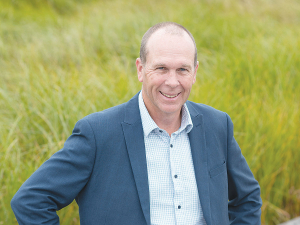State Farmer Delivers Solid Half-Year Result
State farmer Landcorp, trading as Pamu, is a forecasting a full-year net profit of around $100 million.
 Pamu chief executive Mark Leslie says the state-owned farmer is committed to transparency around its emissions reduction journey.
Pamu chief executive Mark Leslie says the state-owned farmer is committed to transparency around its emissions reduction journey.
Pāmu (Landcorp Farming) says its journey to reduce its carbon output has begun with Toitū carbon reduce certification across 20 of its farms.
The state-owned farmer says this is just one step on the company’s path to reducing its carbon emissions by 4% per year to 2024.
“The Toitū carbon reduce certification provides us with a very robust measurement of our emissions, allowing us to identify the best carbon reduction opportunities and measure our progress in reducing emissions,” says Pāmu sustainability manager Sam Bridgeman.
“It provides a clear framework for continuing to measure and reduce our emissions on farm, across the organisation,” Bridgeman told Rural News. “Having a consistent approach using best practices ensures we are holding ourselves to account and meeting our supplier requirements.”
Bridgeman says Pāmu has been working to reduce its environmental impact over the course of several years.
“Our flagship initiatives include breeding animals with lower methane levels and shifting several dairy farms to organic farms.
“We are also developing tailored emissions reductions plans for each farm and are undertaking a firm wide education programme to train our staff on how to identify emissions reductions opportunities,” Bridgeman adds.
Pāmu manages 110 farms over 364,000 hectares, with revenue primarily coming from dairy and livestock farming.
Chief executive Mark Leslie says the state-owned farmer is committed to transparency around its emissions reduction journey.
“We are committed to being a sector leader when it comes to farming and environmental innovation and being a role-model for other agriculture businesses starting their carbon reduction journey,” he says.
Leslie claims the geographic diversity of its farms and range of Pāmu’s stock enables them to trial mitigations and improvements under different conditions.
“There are some big challenges ahead, and we are starting to develop concrete plans to reduce our emissions,” he says. “We also expect to have each of our farms certified by 2024.”
In 2021, Pāmu farms contributed 0.75m gross metric tons of carbon dioxide equivalent and sequestered around 0.33m metric tons of carbon dioxide equivalent.
Dairy Women's Network (DWN) has announced that Taranaki dairy farmer Nicola Bryant will join its Trust Board as an Associate Trustee.
Rural Women New Zealand (RWNZ) says it welcomes the release of a new report into pay equity.
Red meat exports to key quota markets enjoyed $1.4 billion in tariff savings in the 2024-25 financial year.
Remediation NZ (RNZ) has been fined more than $71,000 for discharging offensive odours described by neighbours as smelling like ‘faecal and pig effluent’ from its compositing site near Uruti in North Taranaki.
Two kiwifruit orchards in the Bay of Plenty and one in Northland are this year's finalists for the Ahuwhenua Trophy competition.
The Government's chief science advisor, Dr John Roche says the key objective for the science sector in the coming year is bedding down the reforms which sees the merger of the previous entities.

OPINION: A mate of yours truly reckons rural Manawatu families are the latest to suffer under what he calls the…
OPINION: If old Winston Peters thinks building trade relations with new nations, such as India, isn't a necessary investment in…